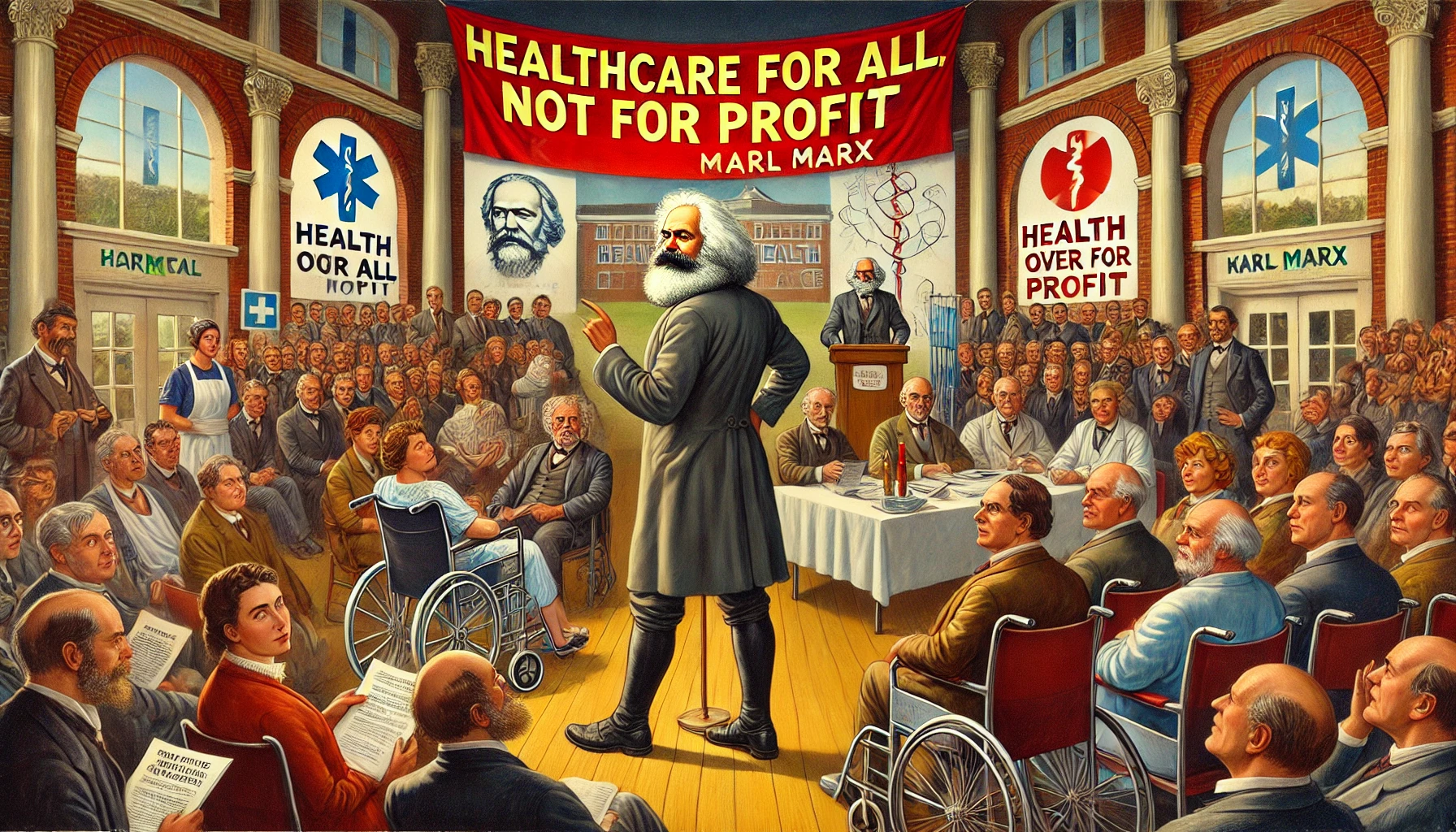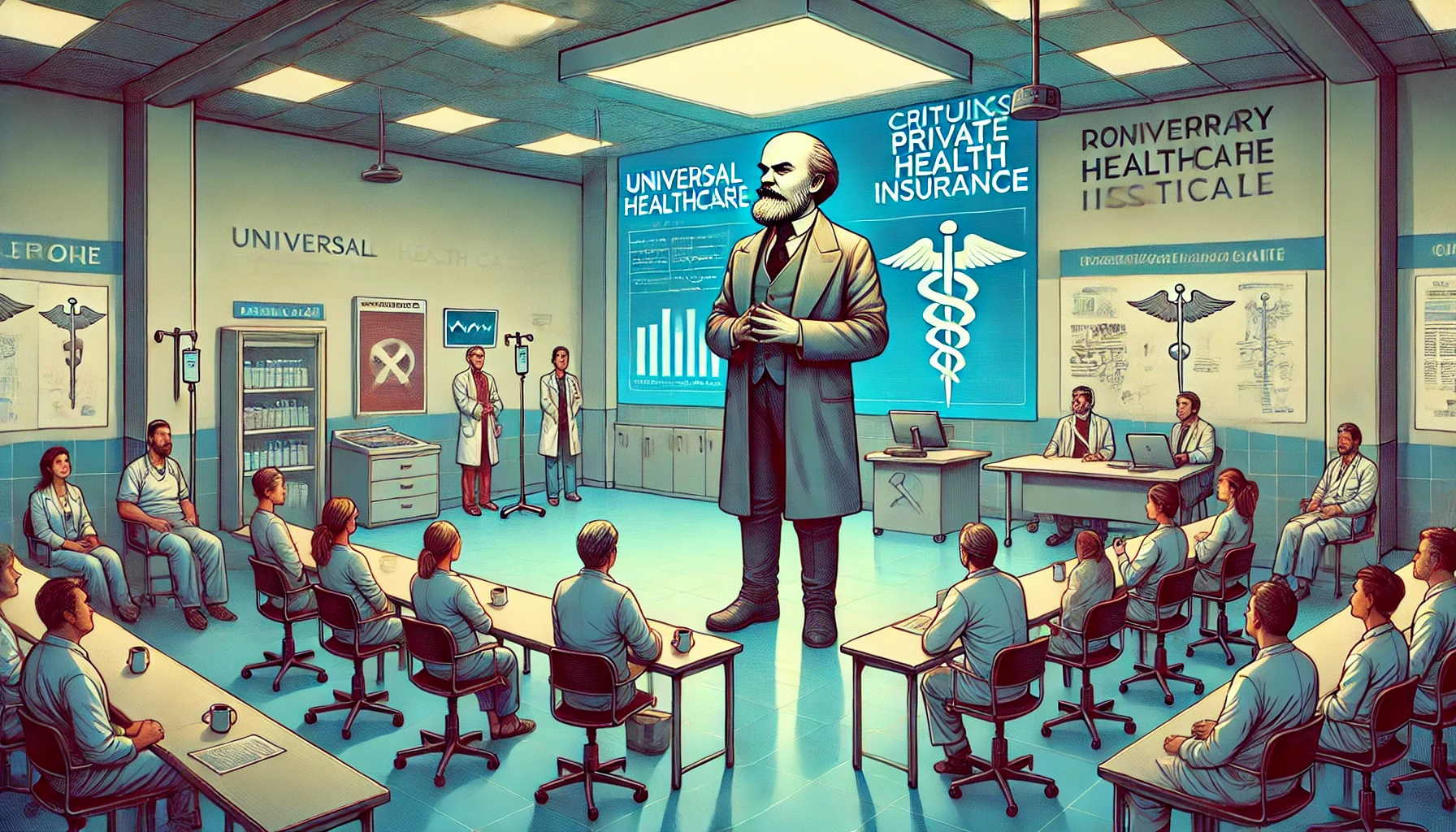Marx Would Have Hated Private Health Insurance
Karl Marx, the revolutionary philosopher and economist, critiqued capitalism as a system built on exploitation, inequality, and alienation. His ideas, while conceived in the 19th century, remain remarkably relevant in analyzing modern institutions such as private health insurance. For Marx, any system that commodifies essential human needs would be viewed as a mechanism of oppression. Private health insurance epitomizes this commodification, turning access to healthcare—a fundamental human right—into a market transaction.
This essay argues that private health insurance, by its very nature, perpetuates class inequality, reinforces alienation, and prioritizes profit over human well-being, aligning it squarely with the critiques Marx leveled against capitalist systems. Through an exploration of Marx’s theories, the historical context of private health insurance, and its societal impacts, we will demonstrate why Marx would have vehemently opposed its existence and operation.
1. Private Health Insurance as a Tool of Class Oppression
At the core of Marx’s critique of capitalism is the idea of class struggle. Marx argued that capitalism thrives on the exploitation of the working class (proletariat) by the ruling class (bourgeoisie). Private health insurance exemplifies this dynamic by creating a system where access to healthcare depends on one’s ability to pay, thereby exacerbating socioeconomic inequality.
Healthcare as a Commodity
For Marx, one of capitalism’s defining traits is its transformation of human needs into commodities. Private health insurance commodifies healthcare, making it a product to be bought and sold rather than a universally accessible service. This commodification benefits insurers and healthcare corporations at the expense of ordinary people, particularly the working class. Instead of guaranteeing care based on need, private health insurance prioritizes those who can afford premiums, co-pays, and deductibles.
The Two-Tiered System
The United States, where private health insurance dominates, provides a stark example of this class division. Wealthier individuals can afford comprehensive insurance plans or pay out-of-pocket for superior care, while the poor are often relegated to underfunded public programs or remain uninsured altogether. This two-tiered system aligns with Marx’s assertion that capitalism divides society into “haves” and “have-nots,” with the latter bearing the brunt of systemic inequities.
2. Alienation and the Health Insurance Model
Marx’s theory of alienation describes how workers in capitalist societies are estranged from the products of their labor, their own humanity, and their fellow humans. Private health insurance contributes to this alienation by distancing individuals from the healthcare decisions that affect their lives and turning human suffering into a profit-generating enterprise.
Alienation from Healthcare Decisions
Patients in private health insurance systems often find themselves alienated from their own healthcare decisions. Insurers, rather than doctors or patients, frequently dictate what treatments are covered, which medications are approved, and what providers can be seen. This interference undermines the patient-doctor relationship, reducing healthcare to a bureaucratic transaction governed by profit motives.
Healthcare Workers as Commodities
The alienation extends to healthcare workers, who are increasingly treated as cost centers in a profit-driven system. Nurses, doctors, and other professionals face burnout and moral injury as they grapple with administrative burdens and the pressure to maximize efficiency and revenue. This dehumanization of healthcare workers mirrors Marx’s critique of how capitalism estranges workers from the value they create.
3. Profit Over People: The Ethics of Private Health Insurance
Marx viewed capitalism as fundamentally unethical, arguing that it prioritizes profit over human welfare. Private health insurance operates on this exact principle, valuing financial gain over the well-being of individuals.
The Business Model of Denial
Private insurers make money by collecting premiums while minimizing payouts for care. This profit-driven model incentivizes the denial of claims, delays in approval, and the imposition of high out-of-pocket costs. Patients suffering from chronic illnesses, rare diseases, or expensive medical needs are often left to navigate a maze of bureaucracy, with many ultimately denied the care they require.
Medical Bankruptcy
In the United States, medical debt is one of the leading causes of bankruptcy. This financial devastation disproportionately affects the working class, illustrating the predatory nature of a system that profits from human vulnerability. Marx would likely argue that such a system not only exploits individuals but also perpetuates broader social inequalities.
4. Historical Parallels to Marx’s Critiques
Marx’s writings were deeply influenced by the industrial revolution and the socio-economic conditions of 19th-century Europe. Although healthcare was not a major focus of his work, his critiques of capitalist systems can be directly applied to the evolution of private health insurance.
The Emergence of Private Health Insurance
Private health insurance emerged in the early 20th century as a response to rising medical costs and industrialization. However, its growth was not driven by altruism but by the interests of corporations seeking to profit from human needs. For Marx, this would have been another example of capitalism’s ability to commodify and exploit every aspect of life, from housing to healthcare.
The Welfare State and Its Erosion
The mid-20th century saw the rise of welfare states in Europe, where healthcare was largely socialized. Marx might have viewed this as a step toward decommodification. However, in countries like the United States, where private insurance persisted, Marx would have seen the system’s entrenchment as a failure to challenge the capitalist underpinnings of healthcare delivery.
5. Modern Manifestations of Exploitation
Private health insurance today operates as a microcosm of the broader capitalist system, perpetuating exploitation, inequality, and alienation in increasingly sophisticated ways.
Pharmaceutical Profiteering
The private insurance model often works hand-in-glove with pharmaceutical companies to maximize profits. Patients are routinely denied access to affordable medications, with insurers and pharmaceutical firms benefiting from inflated prices. Marx would likely argue that this collusion exemplifies how capitalism exploits human suffering for financial gain.
Administrative Waste
Studies show that private health insurance systems generate significantly higher administrative costs than public systems like Medicare or the NHS. These inefficiencies funnel resources away from patient care and into bureaucratic overhead, enriching executives while leaving patients underserved. This wastefulness reflects Marx’s critique of capitalism as inherently inefficient and exploitative.
6. The Marxist Alternative: Decommodifying Healthcare
Marx’s ultimate goal was the abolition of capitalism and the establishment of a socialist society where resources are distributed based on need rather than profit. In the realm of healthcare, this vision translates into decommodification—removing market mechanisms from the provision of medical care.
Single-Payer Healthcare
A single-payer system, where the government funds healthcare through taxes, aligns closely with Marxist principles. Such a system eliminates the profit motive, ensures universal access, and reduces administrative inefficiencies. Countries like Canada and the UK provide examples of how this model can deliver more equitable outcomes than private insurance-dominated systems.
Public Ownership of Pharmaceuticals
Marx might also advocate for public ownership of pharmaceutical companies, ensuring that lifesaving medications are treated as public goods rather than profit-generating commodities. This approach would prioritize research and development based on public health needs rather than market demand.
7. Social Movements and Healthcare Reform
Marx emphasized the importance of collective action in challenging capitalist systems. In today’s context, movements advocating for Medicare for All or similar reforms embody this spirit of resistance.
Grassroots Mobilization
Organizations like National Nurses United and Physicians for a National Health Program have been at the forefront of advocating for healthcare reform in the United States. These movements challenge the dominance of private insurers and push for a system rooted in equity and accessibility.
The Role of Labor Unions
Unions, which Marx viewed as essential to class struggle, play a crucial role in the fight for healthcare reform. By negotiating for better health benefits and supporting broader policy changes, unions help to dismantle the power of private insurers.
8. Counterarguments and Marx’s Rebuttal
Critics of universal healthcare often argue that private insurance fosters innovation, offers choice, and ensures higher-quality care. Marx would likely counter these claims by exposing the systemic inefficiencies and inequities inherent in the private model.
Innovation vs. Exploitation
While private insurers and pharmaceutical companies tout innovation, much of their profit-driven research focuses on marketable treatments rather than addressing pressing public health needs. Marx would argue that a publicly funded system could direct resources toward genuine innovation without exploiting patients.
Choice as Illusion
The notion of “choice” in private health insurance is often illusory, as patients are constrained by network limitations, coverage restrictions, and cost barriers. Marx would dismiss this rhetoric as a capitalist ploy to mask systemic failures.
Conclusion: Marx’s Enduring Relevance in Healthcare
Karl Marx’s critique of capitalism provides a powerful lens through which to examine private health insurance. By commodifying healthcare, exacerbating class inequalities, and prioritizing profit over human well-being, private health insurance embodies the very systems of exploitation and alienation that Marx sought to dismantle.
While Marx’s solutions may not align perfectly with modern political realities, his emphasis on equity, decommodification, and collective action offers valuable insights for reimagining healthcare in the 21st century. As debates over healthcare reform continue, the enduring relevance of Marx’s ideas serves as a reminder that a more just and equitable system is not only possible but imperative.
Originally posted 2024-09-20 02:12:37.



